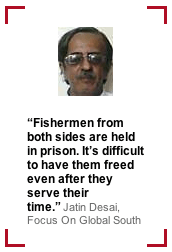By Afsar Jafri
Nairobi – Less than a kilometer away from the Kenyatta International Conference Centre (KICC) in Nairobi where the 10th Ministerial Conference started on Tuesday, 15th December, Via Campesina farmers from Asia, Africa, Europe, and Americas also began their two-day (15th and 16th December) seminar on “20 years of WTO and the struggle to dismantle it.” Here, they deliberated on various aspects of the multilateral free trade regime represented by the World Trade Organisation and their impact on the small farmers of the world, especially in the global south. The women’s groups, slum dwellers, hawkers, and common people of Nairobi belonging to the World March for Women, Bunge la Mwananchi, Centre for Constitution Implementation, Dandora Must Change, Wanana Sasa na Uwanguzi, and Mathera Social Justice Centre also joined them in large numbers at the YWCA. The situation of Kenyan farmers is not very different from their counterparts in Asia or others parts of Africa; they are all greatly affected by the onslaught of WTO policies.
In Kenya, there are seven farmers out of every 10 Kenyans;majority are women,who are actually farming because their male partners have moved to urban areas to seek other employment because farming has brought in less income. Though most of these small farmers grow corn, which is Kenya’s staple diet, they face a greater threat from the dumping of GM corn from the US in the form of food aid. Kenya experienced its worst food crisis between 2002 and2006 when maize prices increased several times. Thus, in these past two in Nairobi, farmers presented their testimonies of how the WTO policies have affecter them, and also discussed the ways toward an alternative.
Sushi from Japan Family Farm Coalition said that though Japan was a developed country, since the WTO came into being, 40 percent of its farmers had quit farming, and their number had declined from 3.45 million in 1995 to 2.15 million in 2015. The average farm size now is reduced to 1.5 hectares. Small farmers are in distress because of the aggressive export policies of the Japanese Government for industrial products, allowing excessive food imports in return, while also causing import surges and sharp decline in farmers’ income. Japanese food self-sufficiency was already low at 43 percent in 1995 but has been further reduced to 39 percent at present. Under the WTO “no farmer can be a winner; winners are only transnational corporations who are acquiring market access to dump their produce at the cost of small farmers and their livelihood.
Baramee Chairat from Thailand’s Assembly of the Poor said Thai farmers especially rice growers were also in distress especially after the removal of the subsidies and premium price they had been getting earlier. But now, the Thai government has withdrawn the subsidies and price support under the pressure of the WTO to reduce their subsidies.
Rakesh Tikait from Bhartiya Kissan Union (India) highlighted how trade liberalization has compromised food self-sufficiency in India, especially in edible oil and pulses. In the early 1990’s, India was self-sufficient in edible oil but under the WTO when quantitative restriction (QRs) were removed and tariff was reduced to below 15 percent to allow import of soyabean from the US, import dependency for edible oil increased and today 57percent of India’s edible oil consumption are imported. India saw the same impact when the Indian government reduced import duty on pulses. India is now dependent for 25 percent of its consumption of pulses on imports. Similar to the impact on Cotton4 (C4) countries in Africa due to the heavy subsidization of cotton in the US in the ‘20’s, a large number of cotton farmers in India committed suicides in India from 2002 onwards due to international price depression and excessive imports causing the crashing of prices of locally produced cotton in the domestic market. Chamarasa Patil from Karnataka Rajya Raitha Sangha (KRRS, India) said that the WTO and its inhumane and immoral policies have converted India into a graveyard of farmers in last 20 years, as more than 300,000 farmers have committed suicides since 1995 due to pro-corporate and anti-small farmers policies of this multilateral free trade regime. Sella Mutthu of Tamilnadu Farmers Association said that whatever is the cost, we have to see the end of WTO in Nairobi.
Cho Byung-ok of Korean Peasants League (KMP) said that farmers in Korea are facing a tough time since the lowering of tariffs of rice in 2014 under the pressure from WTO; now they are forced to import rice despite South Korea having surplus production of rice which led to crash in rice prices. More than 70,000 farmers protested against this policy in November this year but they were water-cannoned and a 69-year-old farmer, Baek Nam-gi, got seriously injured, lying unconscious at a hospital until this time. A fellow Korean farmer Lee Kyung-hae also committed suicide during the WTO Ministerial in Cancun in 2013, while shouting “WTO Kills Farmers.”
Cidi Otiemo from the Coalition for the Implementation of the Constitution in Kenya said that the WTO has killed “our sugar farmers.” “It has killed the coffee and tea growers in Kenya because some of the coffee brands from Kenya have been monopolized in Europe, resulting in the exploitation of our coffee farmers from whom these companies buy coffee at low prices,” he also said.
Cheap imports of maize and sugar have rendered Kenyan farmers jobless. Free market economy and import liberalization under the WTO have forced Kenyan consumers to depend on foreign goods at the expense of their local producers. In slums of Nairobi, Mathare, and Kinbera, the Nairobi county government has cut water supplies and installed pre-paid water meters managed by foreign companies, all in the name of attracting investors to come to Kenya, meanwhile causing great hardship for locals in accessing water in adequate quality and quantity.
While the farmers and urban poor discussed the hardships brought about by WTO policies, WTO Member States WTO started the negotiations at KICC on exactly the same issues but from a different perspective: “how to get more market access in agrThis second group would want to introduce 21st century new Issues (including Singapore issues like Investment, Competition policy, Public Procurement, e-commerce, Global value chains, environmental services etc) to further expand markets in developing countries for their transnational corporations.
On 15th and 16th December, after the meeting at YWCA, farmers and local people had an impromptu March on the streets of Nairobi led by Korean farmers from KPL and held a demonstration at the Tom Mboya Monument in the center of the city, very close to the KICC.
On December 17 in Nairobi, there will be an #EndWTO march starting at 9am from Freedom Corner to Tom Mboya Monument, passing through Kenyatta Avenue, Kimathi Street, Moi Avenue, City Hall Way to KICC, then to Parliament Road, Harambee Avenue, Moi Avenue.
Some glitches at the Negotiation at MC 10
In agriculture, the US and other developed countries have maintained that they will not provide Special Safeguard Mechanisms (SSM) to developing countries, which can help the latter protect their local producers from excessive imports by temporarily increasing tariff.
A key development was a change in Indonesian position, the leader of the G33 groups of countries, which skipped any mention of SSM to protect developing countries from sudden surges of farm goods.
Another important development on Wednesday, 16th December, was the surprising non-mention byIndia of the issue of food stockholding. Indian Minister Ms. Sitharaman completely skipped the issue of food stockholding when she made a statement in the open-ended Agriculture meeting. It is still premature to say anything on this but if this is a sign of India changing its position, it will be disastrous for the farmers in the developing countries with public stockholding programs to ensure food security in their country.
However, the most serious development was the conclusion of a deal among 53 WTO members on cutting tariff on information and communication goods (ITA –II) and removal of tariff from 201 products. This is an update to the WTO’s 1996 Information Technology Agreement (ITA) and it has been estimated that this expanded deal will bring a gain of US $ 1.3 trillion in annual trade. But the fact is the ITA-1 has led to the complete destruction of electronics industry and computer industry in India and now the ITA –II will cause further damage to this industry in other developing countries.








